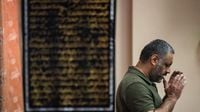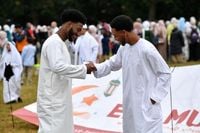Almost two billion people around the globe are preparing to celebrate Eid al-Fitr, marking the end of Ramadan this weekend, depending on the sighting of the moon. Eid al-Fitr is set to take place on Sunday, March 30, or Monday, March 31, 2025. Ramadan, which began at sunset on February 28, is a month dedicated to fasting, prayer, and reflection for Muslims worldwide.
During Ramadan, Muslims observe fasts from sunrise to sunset, breaking their fast each evening in a meal known as iftar. This sacred month emphasizes spiritual growth, self-discipline, and compassion, with many also engaging in additional prayers and charitable acts. Eid al-Fitr, which translates to "the festival of breaking the fast," symbolizes the conclusion of this holy month and is celebrated with communal prayers, family gatherings, and festive meals.
As the end of Ramadan approaches, Muslims worldwide are eagerly anticipating the celebrations. The Islamic calendar, which is based on the lunar cycle, causes the date of Eid to change each year, moving approximately 11 days earlier annually. The sighting of the crescent moon signifies the conclusion of Ramadan and the commencement of the month of Shawwal.
In various countries, different methods are used to determine the sighting of the moon. For instance, in Saudi Arabia, the end of Ramadan is announced based on the number of people who see the moon, while in Iran, an official government announcement is required. In many parts of Europe, local Muslim leaders typically make the announcement.
The celebration of Eid al-Fitr traditionally begins with special morning prayers held at mosques or open spaces to accommodate large gatherings. In many Muslim-majority countries, Eid is recognized as a national holiday, enabling families and friends to come together for the festivities. The greeting exchanged during this time is "Eid Mubarak," which means "blessed Eid."
The culinary aspect of Eid is particularly vibrant, as families share a variety of traditional dishes that hold cultural significance. Popular savory dishes enjoyed during this festive time include biryani, kebabs, and haleem, while sweet treats such as sheer khurma, a rich pudding made with vermicelli, dates, and nuts, are also favorites. The spirit of generosity is emphasized during Eid, with families often exchanging gifts and dressing in their best clothes as a sign of gratitude for the blessings received during Ramadan.
Additionally, towards the end of Ramadan, it is customary for the head of each family to make a charity donation known as Zakat al-Fitr. This donation is intended to help those less fortunate celebrate Eid and reflects the values of compassion outlined in the five pillars of Islam.
Ramadan, the ninth month of the Islamic calendar, is believed to be the time when the Qur'an was first revealed to the Prophet Muhammad in A.D. 610. This month is not only about fasting but also about deepening one's spiritual connection and increasing awareness of the needs of others. Muslims are encouraged to engage in prayer and reflection, dedicating time to worship and study the Qur'an.
Fasting during Ramadan is one of the Five Pillars of Islam, which are essential acts of worship that define a Muslim's faith and practice. These pillars include the profession of faith (shahadah), prayer (salah), almsgiving (zakat), fasting (sawm), and pilgrimage to Mecca (hajj). Fasting is seen as an act of deep personal worship, allowing Muslims to seek a richer perception of God and cultivate self-discipline.
In the United States, the Muslim population is significant, with approximately 3.45 million practicing Muslims as of 2017. States such as New York, California, Illinois, New Jersey, Texas, and Michigan have the largest Muslim communities. Despite the growing numbers, there remains a notable gap in Ramadan-related marketing, as highlighted in a 2024 report by Mojo Supermarket, which found a lack of recognition for Ramadan in mainstream advertising.
As Eid al-Fitr approaches, many Muslims are not only looking forward to the celebrations but also reflecting on the spiritual journey of Ramadan. The month has been a time for cleansing the soul and spirit, and the culmination of fasting is met with joy and gratitude. For many, Eid is a moment to reconnect with family and friends, share meals, and express thanks for the blessings of the past month.
In workplaces, the observance of Ramadan can sometimes lead to misunderstandings or lack of awareness among colleagues. As such, it is essential for businesses and organizations to foster an environment of understanding and support for those observing Ramadan. This can include accommodating flexible schedules for fasting employees and promoting awareness about the significance of this holy month.
As the world prepares for Eid al-Fitr, the significance of this celebration extends beyond just the festivities. It serves as a reminder of the values of compassion, community, and gratitude that are central to the Islamic faith. In a time where unity and understanding are more important than ever, Eid al-Fitr stands as a beacon of hope and joy for millions around the world.







